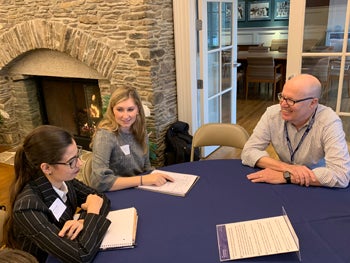 An internship and other forms of experiential learning can provide an invaluable complement to the classic liberal arts education. In the Harrington School of Communication and Media at the University of Rhode Island, students are strongly encouraged to do at least one internship or to engage in hands-on experiential learning opportunities, from partnering with a professor on a research project to helping to run the in-house Media Agency, responsible for spreading the word of everything Harrington. Three years ago, Harrington School Director and Associate Dean Adam Roth developed another unique approach to experiential learning. Growing from his leadership of the Executive Advisory Board, Roth noticed how much the media executives enjoyed interacting with Harrington students during the biannual board meetings. Roth sought to extend this relationship through setting up the Harrington School Mentoring Program.
An internship and other forms of experiential learning can provide an invaluable complement to the classic liberal arts education. In the Harrington School of Communication and Media at the University of Rhode Island, students are strongly encouraged to do at least one internship or to engage in hands-on experiential learning opportunities, from partnering with a professor on a research project to helping to run the in-house Media Agency, responsible for spreading the word of everything Harrington. Three years ago, Harrington School Director and Associate Dean Adam Roth developed another unique approach to experiential learning. Growing from his leadership of the Executive Advisory Board, Roth noticed how much the media executives enjoyed interacting with Harrington students during the biannual board meetings. Roth sought to extend this relationship through setting up the Harrington School Mentoring Program.
Now in its third iteration, the Harrington Mentoring Program matches students with media professionals; many, but not all, are part of the Executive Advisory Board. Among the mentors are executives from leading PR agencies, television networks, and news organizations. The goal is for the students to understand the realities and opportunities of working in a professional environment. While mentors and mentees are paired based on common fields within the communication industries, the Mentoring Program is designed to be far more than mere networking. The mentoring relationship presents students with the precious chance to learn from those who have succeeded in their media and communication careers. Students are prepared for mentoring through an orientation session led by the Mentoring Director outlining the benefits and responsibilities of being mentored. From that point on, the mentoring pair begins their relationship. With an initial phone call, the mentor and mentee discuss the desired outcomes from the mentoring relationship. Many students seek to gain guidance on how to start their own professional careers and to learn strategies and approaches for dealing with a variety of challenges posed by the workplace. Over the course of a semester, the mentoring pair interacts, whether in person, by phone or by Skype. The exact way through which the mentoring relationship unfolds varies considerably: some mentors set up a ‘shadow day’ so their mentees can understand the realities of the workplace; others schedule weekly check-in meetings to discuss a variety of issues from reviewing a resume, giving advice on ways to prepare for the job world, or talking about much-needed skills for a particular industry.
With the program expanding year-to-year and favorable feedback from both mentors and mentees, the Harrington Mentoring Program has gained a reputation in the School for being a great way to augment course learning and internships in preparation for that crucial first job. Students are impressed by the commitment of the mentors and the ways through which the relationship deepens their understanding of the professional world. As one mentee commented at the end of the program, “the highlight of the Mentoring Program was being able to get to know someone who cares so much about the success of Harrington School students and who has experienced great success themselves.” The mentors’ reactions to their experience are also overwhelmingly favorable, with the common theme of appreciating the chance to give back
